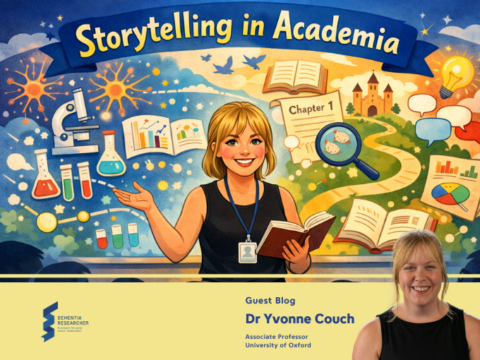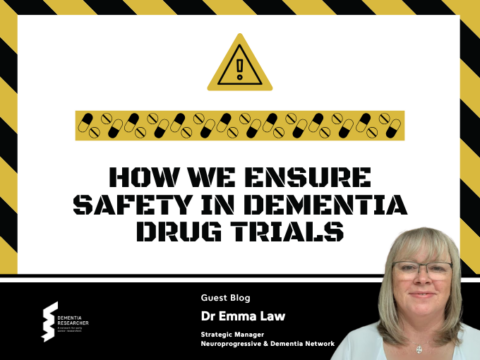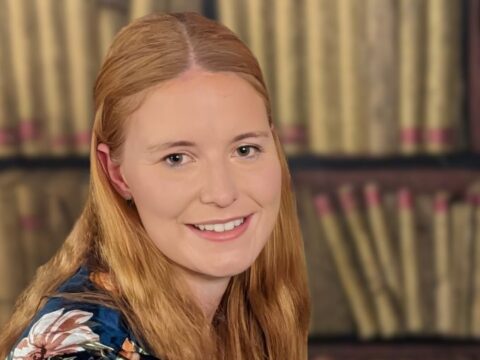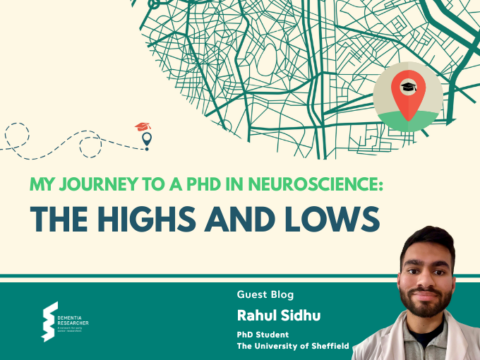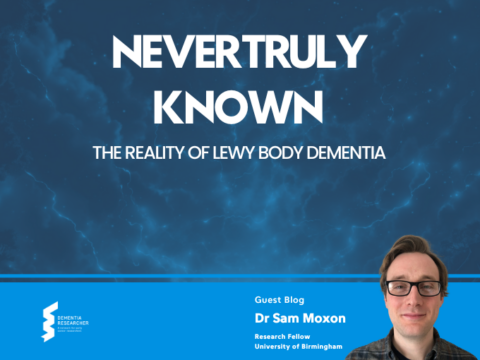Each year, the 21st of June is a special day of recognition and acknowledgment of the impact that Motor Neuron Disease (MND) has on people’s lives around the world. Interestingly, this date marks the summer solstice and was selected to symbolize the start of a new year of hope to find the cure for this devastating condition.
My name is Athena and I am a second year undergraduate Neuroscience student at the University of Dundee. I moved to Scotland from a small island in Greece for the opportunity to study Neuroscience, which doesn’t exist at undergraduate level back home. I have had my heart set on studying the brain for a while, it was very clear for me since the moment I came to appreciate that it is the most intricate collection of atoms in the known universe and underlies the whole scope of human experience. Here in Dundee there is a lot of research focused on neurodegeneration aiming to understand the diseases related to this phenomenon at many different levels, which is why I chose this university.
Currently, as part of a vacation scholarship scheme I am undertaking an internship at Dr Henstridge’s lab at the School of Medicine in the University of Dundee. The lab’s overarching focus is trying to understand the breakdown of connection points between brain cells in MND, in the hope of discovering new ways to treat it.
For MND awareness day coming up, I feel that it is of uttermost importance to hear and learn from the researchers committed to finding out more about this disease, acknowledging that these scientists are the hope for furthering all medical advancements.
Being right at the beginning of my scientific career, I’m interested to hear about how others have navigated their own paths in research. To get insight from an experienced researcher I am working alongside, I will be asking Dr Zsófia László, MNDA Junior fellow, a few questions.
Could you please tell me a little bit about yourself?
First of all thank you so much for preparing this interview and raising awareness of MND which affect so many people globally.
I moved to Scotland 4 years ago right after I completed my PhD. There is an obvious carrier path for academic researchers, once you are close to finishing the PhD you usually look for postdoctoral positions in different labs to gain as much as experience, knowledge and research culture as possible. This usually has the added caveat of relocation to a foreign country. It was a challenging period for everyone with the global pandemic still ongoing, but to find my next lab and make that big step was very scary for me, especially between lockdowns.
I came from a different research field not encompassing neurodegenerative disease or MND. I started my undergraduate studies and then made my PhD in the Molecular Neurobiology laboratory at the Institute of Experimental Medicine in Budapest, Hungary. This lab along with many others, focuses on the most fragile and I can say that the most important part of our consciousness, the connection between neuronal cells, called synapses. Proper brain development is impossible without these delicate structures, and the information could not spread from one neuron to another. Although I really enjoyed investigating synapse-related signalling pathways, especially during brain growth, helping people became a focus of mine. I wanted to put more effort to understand the kind of brain diseases which affect so many people globally.
What has intrigued coming into a lab with a very clear objective is how different people have ended up in the same exact setting, with a shared goal and drive to study this disease. Why did chose Dr Henstridge’s lab? Did you have any preconceptions of joining lab in Scotland?
I found the project advert very exciting, potentially opening up new avenues in the MND field and helping people living with the disease, it was the research theme that I was looking for. There was also a strong overlap between my PhD work and Chris’s research focus, so I was confident I could contribute to the new lab’s research. Regarding the laboratory, I didn’t really have any preconceptions about the Henstridge lab, I knew that it was established in 2019 so basically a year before I applied. During the interviews everyone was very welcoming and nice, and to be honest if you want to do good science you don’t need much more than a welcoming and supportive environment…although funding helps! I also knew Chris personally from my undergraduate years in Budapest, he was the first foreign postdoctoral researcher in our lab. We had been working together for more than 4 years. After I accepted the job offer, things are progressed very quickly, I defended my PhD successfully and 3 days later we were flying to Scotland.
That must have been quite daunting. I really appreciate your comment about a friendly environment being crucial in order for people to flourish in a new place and feel content. I feel like I could not have hoped for a better place to experience a working lab for the first time. It is a very welcoming environment and besides experiencing the working aspect, I am getting a lot of advice about research careers in general. Overall, it is nowhere near as scary as I expected and I am really enjoying it.
Meeting people with all different scientific and cultural background has made me think about how someone settles on dedicating their life to studying one specific disease. What pushed you to want to study this type of disease and focus on neurodegeneration in general?
It sounds cliché but I read a couple of Stephen Hawking’s books, and I was always amazed by his research, his concepts about how the universe works. On the other hand, I was also wondering, how difficult it could be to be one of the greatest minds of mankind imprisoned in his own body because of MND. When I met with my husband, he also told me that one of his close relatives died due to ALS which is the most common form of MND, and he described how difficult it was to witness someone lose their freedom of movement and capabilities day-by-day until the end. Therefore, I got some insight into a carer/relative perspective which made me even more motivated to apply for this postdoctoral position.
It is beautiful how people’s stories, especially expressed through art, have a way of touching you and making you think about your own life in a different light. I also have found inspiration from many people’s lives and their art. If I had to pinpoint my biggest source of inspiration for studying the brain it would without doubt be the book ‘The Man Who Mistook His Wife for a Hat’, which explores how people’s different experiences or perspectives of life have neurological basis. Also, specifically for neurogenerative diseases the book ‘Awakenings’ about an incredible clinical trial impacted me massively. Both books by my hero, Dr Oliver Sacks.
Going back to your career, currently what is your specific area of interest in researching MND?
As you mentioned in your introduction the Henstridge lab focuses on the molecular and cellular aspects of the connection loss between neurons, the synapses. This decrease in synapses is associated with change in thinking skills in MND. We aim to unfold what is the reason behind the loss of synapses in MND. My project specifically investigates the effect of glial cells on synapse loss. Glial cells are important participants of brain function by maintaining the health of other brain cells. If we think about how a good hotel works, there are different departments which are all responsible for making our stay as perfect and smooth as possible. If the housekeeping is not working well, our room and common areas will be messy, if the chef cannot prepare the dinner there won’t have anything to eat, if there is no one at reception to call or the phone is out of order we cannot complain, therefore our holiday will be ruined. In our brain glia cells are the housekeeping and kitchen department, if they are affected by brain diseases, they cannot serve neurons and their synapses anymore. Moreover, in neurodegenerative diseases, glia cells turn from supporters to enemies and negatively affect the survival of neurons by engulfing synapses. I aimed to examine how glia cells react to MND affected synapses, how we can target glia to decrease the ingestion of synapses and ultimately prevent neuronal loss.
That’s a very good analogy. I understand that the questions being asked in your research are critical for understanding how MND could be treated. What I would be interested to know is how you reached that research aim.
Interestingly nearly half of the people living with MND shows some form of change in cognitive skills as well as problems with movement. The toxic effect of glia cells has already been showed in other diseases and some interesting pathways have been already targeted. We would like to know if the same approach can be applied to MND and if this could lead to the development of new drugs to treat it.
What have you already achieved in your research?
In the first year of my postdoctoral research, I was able to to show that glial cells can sense signals on the ALS synapses which make them predestine for engulfment. I applied for different fellowships to fund my research. This also comes with the academic path, researchers need to find support for investigating the most important questions and this often costs huge amounts of money. Fellowships are prestigious funding awards that allow the holder to focus all of their time on a specific research topic. However the competition is enormous. I applied at least 5 different organisations/charities with project ideas, and I was honoured to be selected by The Motor Neurone Disease Association for a Lady Edith Wolfson Junior Fellowship, which fully supports my project for 3 years. The fact that my research idea warranted support gave me tremendous amount of motivation, not in small part because they chose me, who was new in the MND field at that time and the first in Scotland to secure this fellowship.
That is very impressive, a huge recognition of your work, congratulations. Could you expand on the impact you would hope your research to have?
I hope that we can find the molecular mechanism behind synapse loss and identify new targets for further drug discovery and therapeutic treatment, which could prove to be life changing for people living with the disease.
About the MND field in general, is there anything you find particularly exciting at the moment?
One very exciting development on the field is the positive outcome of personalized gene therapy. This type of treatment is in the later stages of the clinical trial process. Personalized gene therapy means that researchers can engineer specific molecules to silent a target gene, in the most recent example, the FUS gene. The mutation in FUS gene usually causes juvenile ALS, a highly progressive type of MND manifesting in children or young adults. In the last couple of years researchers tested these engineered molecules in several animal models, followed by a clinical trial starting in 2020. In 2023 at the European ALS conference, Dr Neil Shneider the leader neurologist of the team showed amazing results of a juvenile ALS patient. She was only 16 at the time of diagnosis and thankfully in two months her treatment started. As the disease progressed, she was hospitalized and partially paralyzed. The novel treatment was able to reverse the process and today she can stand up and walk again! Moreover, at the latest International ALS/FTD conference in Basel, Switzerland, she took to the stage by herself for an introduction. It was an amazing, unbelievably touching moment! I will never forget. I hope this personalized treatment soon will be available for other people living with the disease regardless of age.
That sounds very promising. I can imagine that that experience is unforgettable to see right in front of you the impact of research in your field in changing lives.
Do you have more experience interacting with people affected by MND?
International MND conferences provide opportunities for people living with MND and their carers to participate and learn about the latest scientific endeavours aiding the fight against the disease. Our lab is also a part of a trial program which aims to bring the researchers and patients closer in a friendly environment, creating a platform to ask questions about the diseases and gain insight into the everyday life of the research.
This is a great initiative, what did you gain from these meetings?
Meeting with people living with MND is very important for me, because I meet the people who I work for. This gives me massive amounts of motivation, especially on those days when an experiment failed, or we hit a seemingly impossible roadblock. We just need to keep trying and find new ways over and over again. These meetings are such unique opportunities for us researchers and personally I am very grateful for these people living with the disease for their openness for programs such as this.
Absolutely, I am sure it is motivating to meet and hear from the very people you are working to help.
Lastly, I can say now that prior to starting I was unnecessarily worried about how real researchers would approach their experimentation, because the only experience I had was within the confounds of a tightly regulated teaching laboratory. But I have found the researchers here at all levels to be very passionate about the work they are carrying out and happy to talk about it. Also, something that surprised me is the variety of cultural backgrounds of the people working together here in Dundee, that even in a small city in Scotland there are people from all over the world with the same passion. To finish I would like to ask if you have any advice for someone aspiring to have a career in studying MND, such as myself?
I think the key is to be motivated and find an environment where you feel motivated. To be a researcher means that you need to handle so many ups and downs, failed concepts, and experiments. Apart from being resilient, to continue the research on the hardest days, you need to have constant support from your colleagues. If the aim is the same it is always easier to move forward.
I have found it very fascinating how people with different research backgrounds approach things with their unique expertise and experiences. What I have understood is that it is this diversity that allows for a lab team to have the best possible skillset and diverse approaches to tackle a shared goal.
It has been a very interesting and motivational, for myself as a future neuroscientist, chat with Dr László and I cannot thank her enough for taking the time to answer my questions.
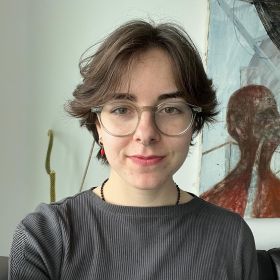
Athena Bratopoulou
Author
Athena Bratopoulou is currently I am doing an internship in the Henstridge Lab at the School of Medicine, University of Dundee, which is centred around synaptoneurosomes in health and in ALS. Athena moved from Greece with her heart set on studying the brain, with a firm belief that it is the single most fascinating thing!

Dr Zsofia Laszlo
Dr Zsofia Laszlo from the School of Medicine, University of Dundee and Euan MacDonald Centre. Zsofia moved to Scotland in October 2020, after finishing her PhD at the Institute of Experimental Medicine in Budapest, Hungary. She joined the laboratory of Euan MacDonald Centre member Dr Chris Henstridge to investigate the mechanisms behind the loss of connection (synapses) between brain cells in MND.

 Print This Post
Print This Post
